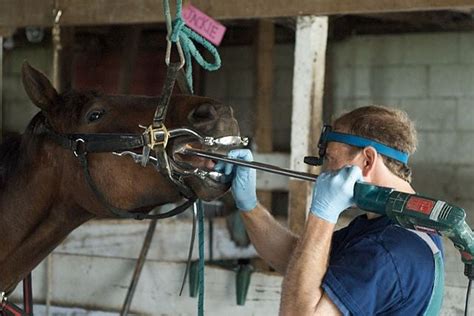Equine Dentistry: A Rewarding Career for Animal Lovers
For animal lovers with a passion for precision and a knack for problem-solving, equine dentistry offers a uniquely rewarding career path. It's a specialized field combining veterinary science, meticulous craftsmanship, and a deep understanding of equine anatomy and behavior. This article delves into the intricacies of equine dentistry, exploring its demanding yet fulfilling aspects and highlighting why it's a compelling career choice for compassionate and dedicated individuals.
What Does an Equine Dentist Do?
Equine dentists, also known as equine veterinary dentists, are responsible for the oral health of horses. This goes far beyond the simple brushing of teeth that you might do for your pet dog or cat. Their work encompasses a wide range of procedures, including:
- Routine dental examinations: Identifying potential issues early on is crucial for preventative care. These exams involve a thorough assessment of the teeth, gums, and surrounding tissues.
- Dental extractions: Sometimes, teeth need to be removed due to disease, fracture, or malocclusion (misalignment).
- Floating: This is a crucial procedure where the sharp edges and points of the teeth are filed down to prevent injury to the gums and cheeks. Horses' teeth continuously grow, making floating a necessary maintenance task.
- Correction of malocclusion: Addressing misaligned teeth often requires specialized techniques and tools to restore proper bite alignment.
- Treatment of periodontal disease: Gingivitis and other gum diseases can significantly impact a horse's health and eating ability. Equine dentists provide treatments and preventative measures.
- Treatment of oral injuries: Injuries to the mouth, such as lacerations or fractures, require careful attention and skillful repair.
- Radiography and other diagnostic techniques: Modern equine dentistry utilizes advanced imaging and diagnostic tools for accurate assessments and treatment planning.
Is Equine Dentistry a Good Career Path?
The demand for skilled equine dentists is steadily growing. The increasing awareness of the importance of equine dental health, combined with the rising popularity of equestrian sports and activities, translates into more opportunities for professionals in this field.
Pros:
- High demand and good earning potential: Skilled equine dentists command competitive salaries.
- Varied and challenging work: No two days are the same, making the job stimulating and engaging.
- Making a tangible difference: You directly improve the well-being and performance of horses.
- Working with animals: The job allows for constant interaction with these magnificent creatures.
- Opportunities for specialization and advanced training: The field offers opportunities for continued professional development.
Cons:
- Physically demanding work: The job can be physically strenuous, requiring long hours of standing and working in sometimes awkward positions.
- Working with large animals: Horses can be unpredictable, requiring a calm and assertive approach.
- Need for specialized training and certification: Becoming a qualified equine dentist requires significant education and experience.
How to Become an Equine Dentist?
The path to becoming an equine dentist typically involves:
- Veterinary Education: Most equine dentists hold a Doctor of Veterinary Medicine (DVM) degree.
- Specialized Training: Following veterinary school, dentists often pursue additional training and certifications in equine dentistry. This may involve residencies, apprenticeships, or continuing education courses.
- Building Experience: Practical experience is crucial. Working alongside experienced equine dentists provides invaluable hands-on learning.
What are the Educational Requirements for Equine Dentistry?
What qualifications do you need to be an equine dentist?
To become an equine dentist, you'll need a Doctor of Veterinary Medicine (DVM) degree, followed by specialized training and certifications in equine dentistry. This often involves residencies, apprenticeships, or extensive continuing education courses focusing on equine oral anatomy, pathology, and advanced dental techniques. The specific requirements might vary based on location and professional organizations.
How long does it take to become an equine dentist?
Becoming an equine dentist requires a significant time commitment. First, you need to complete veterinary school (typically four years), followed by additional years of specialized training in equine dentistry. The total time commitment can range from 8-10 years or more, depending on the chosen training pathway.
What is the average salary for an equine dentist?
The average salary for an equine dentist varies depending on experience, location, and practice setting. However, it's generally a well-compensated profession due to the specialized skills and demand. It's best to research salary data for your specific region.
Is Equine Dentistry Stressful?
Like any veterinary profession, equine dentistry can be stressful. Working with large animals requires patience, skill, and the ability to handle unexpected situations. The physical demands of the job, combined with the emotional investment in the animals' well-being, can contribute to stress levels. However, many equine dentists find the rewards of their work significantly outweigh the challenges.
In conclusion, equine dentistry offers a unique blend of veterinary skill, manual dexterity, and animal care. For those with the necessary dedication, training, and compassion, it's a rewarding career that contributes to the health and well-being of these magnificent creatures.

